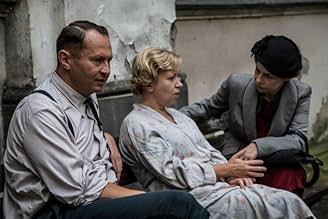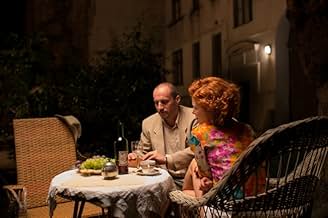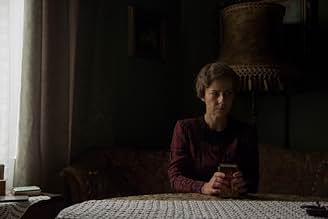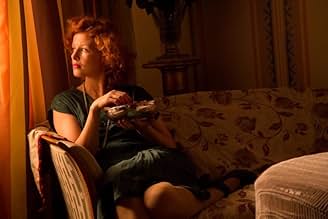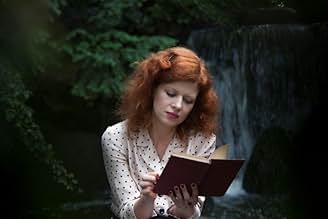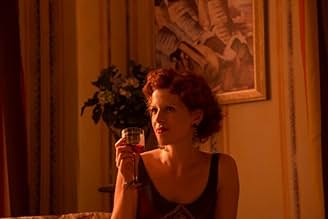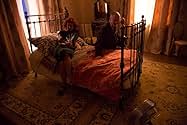अपनी भाषा में प्लॉट जोड़ेंA journalist from Warsaw travels to Silesia and manages to find a tenement house full of exceptional inhabitants.A journalist from Warsaw travels to Silesia and manages to find a tenement house full of exceptional inhabitants.A journalist from Warsaw travels to Silesia and manages to find a tenement house full of exceptional inhabitants.
- पुरस्कार
- 4 जीत और कुल 2 नामांकन
Barbara Lubos-Swies
- Helenka
- (as Barbara Swies)
कहानी
क्या आपको पता है
- साउंडट्रैकRóza
Music by Janusz Wojtarowicz
फीचर्ड रिव्यू
The Polish film Szczescie swiata (2016) was shown in the U.S. with the title The Happiness of the World. It was written and directed by Michal Rosa.
The movie is set in 1939 in an apartment house in Silesia--an area of Poland close to the German border. The apartment house itself is unusual. It's clearly not far from a city, but it sits in lonely isolation in a field. It's a very upscale place, and most of the people who live in it are middle or upper class. It's not what we in the U.S. would call a tenement, with poor people making ends meet. It's very elegant.
The plot centers around a journalist from a large city who is sent to the area to track down an elusive bestselling author. This search is more or less just a way to begin the story. When the reporter arrives, his first meeting is with the beautiful Róza, portrayed by Karolina Gruszka.
Róza has many charms, which she openly displays to the reporter, as well as to any other man who joins her. In turn, director Rosa openly displays Gruszka's charms to his audience. We can all see why she's called "The Happiness of the World."
The movie plot is actually a series of vignettes. Each inhabitant of the apartment building has her or his own story. To a certain extent, the stories intersect, because all of the characters live in the same place. The pivotal figure in all of this is Róza. Karolina Gruszka isn't just another pretty face. She's an extraordinary actor, who is well known in Poland. The movie will rise or fall depending on Gruszka's presence on the screen. She's great, and the film rises accordingly.
We watched this movie in Rochester's excellent Little Theatre. It will work well on the small screen. The film was shown at the outstanding 2017 Rochester Polish Film Festival. After the film, director Rosa was in attendance for a Q&A session. (He doesn't speak English, but the interpreter who worked with him was superb.) My compliments to the PFF for bringing the director to Rochester.
For me, the most striking aspect of the Q&A was Mr. Rosa's discussion of magical realism. I believe that everyone in the audience noted magical realism in the movie. Director Rosa says that it isn't magical realism--it's just realism. I'm not sure if he was joking with us when he said that, or whether he actually believes that the type of events he shows us aren't magical at all. You'll have to watch the movie to see what you think about this realism.
P.S. The Happiness of the World has a dismal IMDb rating of 6.3. It's a much, much better movie than that. Again, you'll have to watch the movie and then decide for yourself.
The movie is set in 1939 in an apartment house in Silesia--an area of Poland close to the German border. The apartment house itself is unusual. It's clearly not far from a city, but it sits in lonely isolation in a field. It's a very upscale place, and most of the people who live in it are middle or upper class. It's not what we in the U.S. would call a tenement, with poor people making ends meet. It's very elegant.
The plot centers around a journalist from a large city who is sent to the area to track down an elusive bestselling author. This search is more or less just a way to begin the story. When the reporter arrives, his first meeting is with the beautiful Róza, portrayed by Karolina Gruszka.
Róza has many charms, which she openly displays to the reporter, as well as to any other man who joins her. In turn, director Rosa openly displays Gruszka's charms to his audience. We can all see why she's called "The Happiness of the World."
The movie plot is actually a series of vignettes. Each inhabitant of the apartment building has her or his own story. To a certain extent, the stories intersect, because all of the characters live in the same place. The pivotal figure in all of this is Róza. Karolina Gruszka isn't just another pretty face. She's an extraordinary actor, who is well known in Poland. The movie will rise or fall depending on Gruszka's presence on the screen. She's great, and the film rises accordingly.
We watched this movie in Rochester's excellent Little Theatre. It will work well on the small screen. The film was shown at the outstanding 2017 Rochester Polish Film Festival. After the film, director Rosa was in attendance for a Q&A session. (He doesn't speak English, but the interpreter who worked with him was superb.) My compliments to the PFF for bringing the director to Rochester.
For me, the most striking aspect of the Q&A was Mr. Rosa's discussion of magical realism. I believe that everyone in the audience noted magical realism in the movie. Director Rosa says that it isn't magical realism--it's just realism. I'm not sure if he was joking with us when he said that, or whether he actually believes that the type of events he shows us aren't magical at all. You'll have to watch the movie to see what you think about this realism.
P.S. The Happiness of the World has a dismal IMDb rating of 6.3. It's a much, much better movie than that. Again, you'll have to watch the movie and then decide for yourself.
टॉप पसंद
रेटिंग देने के लिए साइन-इन करें और वैयक्तिकृत सुझावों के लिए वॉचलिस्ट करें
विवरण
- रिलीज़ की तारीख़
- कंट्री ऑफ़ ओरिजिन
- आधिकारिक साइट
- भाषाएं
- इस रूप में भी जाना जाता है
- Joy in the World
- फ़िल्माने की जगहें
- उत्पादन कंपनियां
- IMDbPro पर और कंपनी क्रेडिट देखें
- चलने की अवधि1 घंटा 38 मिनट
- रंग
इस पेज में योगदान दें
किसी बदलाव का सुझाव दें या अनुपलब्ध कॉन्टेंट जोड़ें


